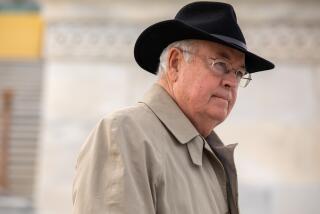Probers Look at Hubbell Earnings
- Share via
WASHINGTON — Federal officials are investigating whether former Associate Atty. Gen. Webster Hubbell may have concealed some of his income from authorities in 1995 when he was sentenced to prison for defrauding his former law firm, sources close to the inquiry said Friday.
The investigation involves hundreds of thousands of dollars that Hubbell received from a variety of sources after he resigned from the Justice Department in 1994.
As previously reported, Whitewater independent counsel Kenneth W. Starr’s investigators are attempting to determine whether the income constituted “hush money” arranged by aides and supporters of President Clinton to encourage Hubbell not to cooperate fully with the Whitewater investigation.
Two top Clinton aides acknowledged this week that they had tried to arrange employment deals for Hubbell after his resignation. They said their help had nothing to do with Whitewater and was offered only out of compassion for Hubbell’s family.
*
Even if the investigation does not yield proof of hush money, sources said, investigators may be able to seek prosecution of Hubbell for failure to disclose income to the probation officer who prepared the presentencing report on which his penalty was based.
Hubbell was recently released from prison after serving a 21-month sentence. He pleaded guilty to tax and fraud charges stemming from the bilking of $482,410 from his former clients and partners at the Rose Law Firm in Little Rock, Ark.
The sentence was the result of a plea bargain, but Starr refused to support a reduction in jail time for Hubbell because he believed that the former Justice Department official failed to cooperate sufficiently with the Whitewater inquiry.
As a former law partner of First Lady Hillary Rodham Clinton, Hubbell was thought to be in a position to provide evidence on legal work Mrs. Clinton did for Whitewater conspirator James B. McDougal. But he failed to provide investigators with the information they wanted.
Sources close to the investigation, who declined to be identified, noted that at the time Hubbell was sentenced in June 1995, he was instructed to make restitution of $135,000--less than one-third of what he admitted stealing.
These sources said that U.S. Judge George Howard in Little Rock agreed to the lower restitution based on Hubbell’s statement during a presentencing interview with his probation officer, Joe Klingbeil, that he had no current personal income and was burdened with debt. Klingbeil could not be reached for comment.
*
It is not known whether Hubbell accounted for all the income from his employment deals to the Internal Revenue Service. His lawyer, John Nields, could not be reached for comment.
Nor is it known exactly how much money Hubbell earned in the period of more than one year between his departure from the Justice Department and his commitment to jail.
Among the paying engagements he received during that period was one from Lippo, the Indonesian-based company owned by Moctar Riady, a friend of Clinton. Lippo and Riady have become central figures in the recent controversy over illegal foreign contributions to Clinton’s 1996 reelection campaign.
White House Chief of Staff Erskine Bowles was subpoenaed Friday to testify before an Arkansas grand jury about Hubbell’s employment deals. White House spokeswoman Beverly Barnes said that the subpoena requires Bowles to testify and produce documents. “He will cooperate fully,” she said.
Presidential counselor Thomas “Mack” McLarty was subpoenaed Thursday. Bowles, then director of the Small Business Administration, and McLarty, a former chief of staff, said this week that they had tried to find employment for Hubbell. Mickey Kantor, former U.S. trade representative and now secretary of Commerce, previously had acknowledged making calls on Hubbell’s behalf.
More to Read
Get the L.A. Times Politics newsletter
Deeply reported insights into legislation, politics and policy from Sacramento, Washington and beyond. In your inbox twice per week.
You may occasionally receive promotional content from the Los Angeles Times.









